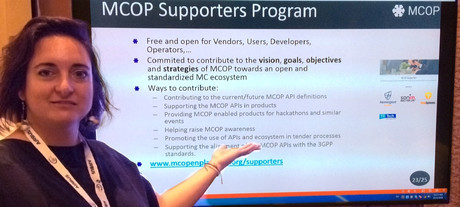MCOP project launches Supporter Program

The Mission Critical Open Platform project has launched a Supporter Program, with a vendor workshop planned for November.
The halfway point in the first phase of the Mission Critical Open Platform (MCOP) project has been marked by the launch of an official Supporter Program to harness the enormous amount of interest that the initiative is creating.
MCOP is designed to catalyse the creation of standards-based, mission-critical PTT (MCPTT) applications, removing the entry barriers of the multiple technologies and proprietary platforms usually involved. MCOP will ensure interoperability and help to encourage more players to enter the MCPTT market by making the business case more attractive. All MCOP components are fully compliant with 3GPP standards.
The advances made by MCOP, and its demonstrations given around the world, have generated a great deal of industry and user enthusiasm for the project. To join the Supporter Program, qualifying organisations will be expected to commit to the principle of using open standards if they wish to formally support MCOP activities.
Supporters can contribute to MCOP in a number of ways, including:
- contributing to the current/future MCOP API definitions
- supporting the MCOP APIs in products
- providing MCOP-enabled products for hackathons and similar events
- helping to raise MCOP awareness
- promoting the use of open APIs and ecosystem in tender processes
- supporting the alignment of the MCOP APIs with the 3GPP standards.
“MCOP is committed to open and standardised mission-critical applications — we are delighted by the level of support for our work from the industry and are creating the Supporter Program to acknowledge this,” said Fidel Liberal, MCOP project coordinator.
“MCOP Supporters have to commit to the vision, goals, objectives and strategies of MCOP. We hope this will give even greater strength to the project, and to open standards generally in critical communications, and grow the community as we move into the next phase.”
Earlier this year, MCOP announced the release of the first version of the Open Source MCPTT SDK, including the source code for a sample MCPTT application, which is available from the MCOP repository. Both the app and the SDK can be remotely tested in a full 3GPP MCPTT system using the MCOP online Testing platform or a live LTE+IMS+eMBMS testbed hosted in the NIST/PSCR labs in Boulder, Colorado.
The first MCOP workshop for user equipment (UE) vendors is planned for November, to explain and help UE vendors how to implement the MCOP APIs on their devices. The workshop will cover technical aspects, licensing issues and the benefits to vendors for their application and customer base.
The MCOP project, funded by the US Department of Commerce’s National Institute of Standards and Technology (NIST), aims to meet the challenges of the emerging and complex MCPTT ecosystem. The project, set to complete by mid-2019, will define, develop and validate an MCPTT client open platform that identifies neat open interfaces between the different technologies and reduces the integration efforts as well as delivering an online testbed for the applications. MCOP is led by the University of the Basque Country with partners Bittium, Expway and TCCA, supported by Nemergent.
Please follow us and share on Twitter and Facebook. You can also subscribe for FREE to our weekly newsletter and bimonthly magazine.
ARCIA update: engaging with industry in 2026
ARCIA is encouraging the radio and critical communications industries to participate in a...
RFUANZ report: welcome to 2026
There has been plenty going on with RFUANZ recently — here are a few of the key things that...
2025–26 Thought Leaders: Tim Karamitos
Tim Karamitos from Ericsson discusses the connectivity requirements of emergency services and...




